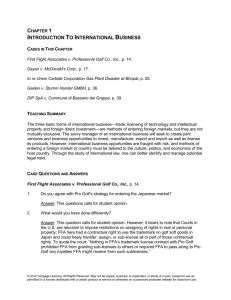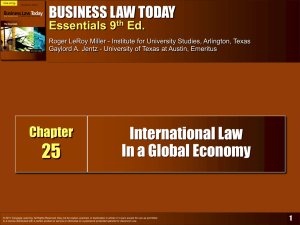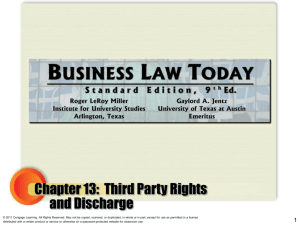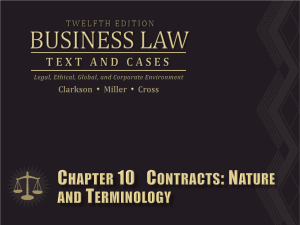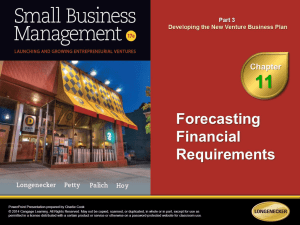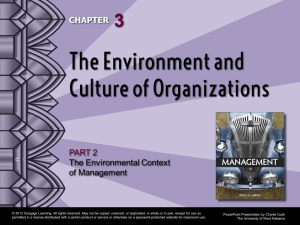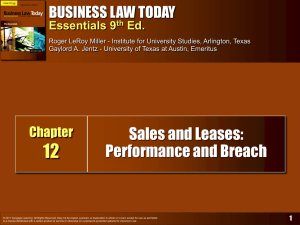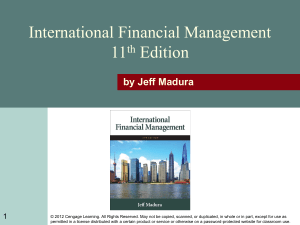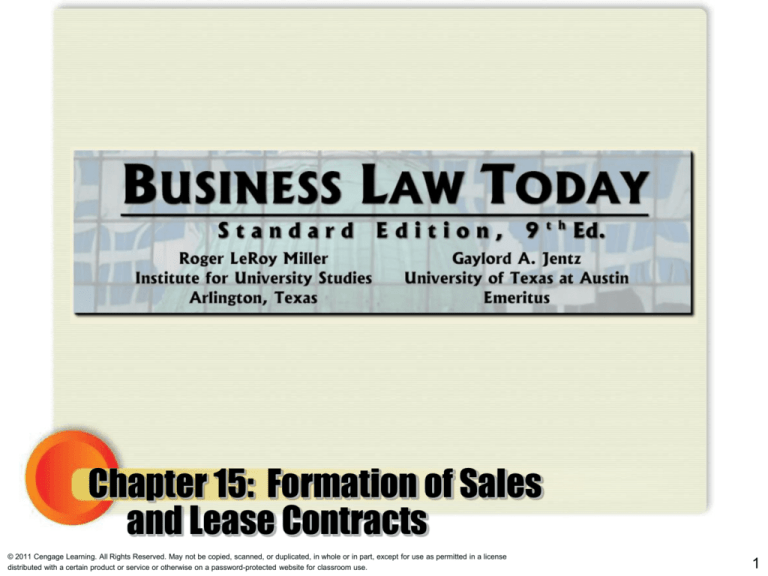
Chapter 15: Formation of Sales
and Lease Contracts
© 2011 Cengage Learning. All Rights Reserved. May not be copied, scanned, or duplicated, in whole or in part, except for use as permitted in a license
distributed with a certain product or service or otherwise on a password-protected website for classroom use.
1
Learning Objectives
• How do Article 2 and Article 2A of the
UCC differ? What types of transactions
does each article cover?
• In a sales contract, if an offeree includes
additional or different terms in an
acceptance, will a contract result? If so,
what happens to these terms?
• What exceptions to the writing
requirements of the Statute of Frauds are
provided in Article 2 and Article 2A of the
UCC?
© 2011 Cengage Learning. All Rights Reserved. May not be copied, scanned, or duplicated, in whole or in part, except for use as permitted in
a license distributed with a certain product or service or otherwise on a password-protected website for classroom use.
2
Learning Objectives
• Risk of loss does not necessarily pass
with title. If the parties to a contract do
not expressly agree when risk passes
and the goods are to be delivered without
movement by the seller, when does risk
pass?
• What law governs contracts for the
international sale of goods?
© 2011 Cengage Learning. All Rights Reserved. May not be copied, scanned, or duplicated, in whole or in part, except for use as permitted in
a license distributed with a certain product or service or otherwise on a password-protected website for classroom use.
3
Scope of UCC Article 2 (Sales) and 2A (Leases)
• UCC:
– Article 2/2A—sale or lease of goods.
– Articles 3-5—negotiable instruments and
banking.
– Article 6—bulk transfers.
– Article 7—warehousing and shipping.
– Article 8—securities.
– Article 9—secured transactions.
© 2011 Cengage Learning. All Rights Reserved. May not be copied, scanned, or duplicated, in whole or in part, except for use as permitted in
a license distributed with a certain product or service or otherwise on a password-protected website for classroom use.
4
Law Governing Contracts
© 2011 Cengage Learning. All Rights Reserved. May not be copied, scanned, or duplicated, in whole or in part, except for use as permitted in
a license distributed with a certain product or service or otherwise on a password-protected website for classroom use.
5
Article 2—Sale of Goods
• What is a “Sale”: passing title from seller
to buyer for a price.
• What are “Goods”: must be tangible and
movable (not land, services or
intangibles).
– Goods Associated With Land.
– Goods and Services Combined.
Case 15.1 Jannusch v. Naffziger.
Terms of oral contract were definite enough to
form an enforceable contract for sale of business.
Naffzigers made payment and breached it.
© 2011 Cengage Learning. All Rights Reserved. May not be copied, scanned, or duplicated, in whole or in part, except for use as permitted in
a license distributed with a certain product or service or otherwise on a password-protected website for classroom use.
6
Article 2—Sale of Goods
• Who is a “Merchant”?
– Generally, Article 2 deals with sale of ALL
goods. However certain higher standards
apply to merchants as opposed to casual
sellers or “consumers”.
– A merchant is one who deals in goods of the kind
sold, and is presumed to posses a high degree of
expertise.
– A merchant holds himself out as having special
skill or knowledge.
– A person who employs a merchant as a broker or
agent has the status of merchant in that situation.
© 2011 Cengage Learning. All Rights Reserved. May not be copied, scanned, or duplicated, in whole or in part, except for use as permitted in
a license distributed with a certain product or service or otherwise on a password-protected website for classroom use.
7
Scope of Article 2A--Leases
• Lease Agreement between Lessor and
Lessee.
– Lessor: sells the right to possession and use
of goods.
– Lessee: acquires right to possess and use
goods under a lease.
• Article 2A: applies to all commercial
and consumer lease/financing of
goods.
© 2011 Cengage Learning. All Rights Reserved. May not be copied, scanned, or duplicated, in whole or in part, except for use as permitted in
a license distributed with a certain product or service or otherwise on a password-protected website for classroom use.
8
Sales Contracts: Offer
• UCC modifies the common law of contracts
as follows:
– Where UCC speaks, it preempts the common law;
– Where UCC is silent, the common law governs.
• A valid offer under UCC 2 may include
“open” (missing) terms:
– Open Price Term: court will determine a reasonable
price at time of delivery and enforce the contract.
– Open Payment Term: payment is due at the time and
place at which buyer is to receive goods.
– Open Delivery Term: buyer takes delivery at seller’s
place of business.
© 2011 Cengage Learning. All Rights Reserved. May not be copied, scanned, or duplicated, in whole or in part, except for use as permitted in
a license distributed with a certain product or service or otherwise on a password-protected website for classroom use.
9
Exception to “Open Terms”
• Open Quantity. If no quantity is
specified, there is NO contract,
unless:
– Requirements Contract: buyer has agreed to
purchase all he needs from seller.
– Output Contract: buyer has agreed to
purchase all the products the seller
manufactures or produces.
© 2011 Cengage Learning. All Rights Reserved. May not be copied, scanned, or duplicated, in whole or in part, except for use as permitted in
a license distributed with a certain product or service or otherwise on a password-protected website for classroom use.
10
Merchant’s Firm Offer
• Under common law, an offer can be
revoked at any time before acceptance,
unless there is an option contract
(offeree pays consideration for offeror’s
irrevocable promise).
• UCC creates a second exception:
– Firm offer occurs when merchant-offeror gives
assurances in a signed writing that the offer will
remain open.
– No consideration is necessary for a reasonable
period (up to 3 months).
© 2011 Cengage Learning. All Rights Reserved. May not be copied, scanned, or duplicated, in whole or in part, except for use as permitted in
a license distributed with a certain product or service or otherwise on a password-protected website for classroom use.
11
Acceptance
• Acceptance.
– Methods of Acceptance: Seller can specify
manner of acceptance. If not, any reasonable
means.
– Promise to Ship/Prompt Shipment of
conforming goods is acceptance.
– Non-Conforming Goods: Prompt shipment of
non-conforming goods is both an acceptance
and a breach, unless the seller notifies the
goods are only an “accommodation.” Notice
of the accommodation must indicate no
contract has been formed.
© 2011 Cengage Learning. All Rights Reserved. May not be copied, scanned, or duplicated, in whole or in part, except for use as permitted in
a license distributed with a certain product or service or otherwise on a password-protected website for classroom use.
12
Additional Terms
• Common Law: terms must be the same
for contract or battle of the forms.
• UCC: additional/different terms
permitted, depending on the status of
the parties:
– Either Non-merchant: only original terms
accepted.
– Both Merchants: additional terms form
contract unless there is prohibition or new
terms or terms materially alter contract, or the
party objects.
© 2011 Cengage Learning. All Rights Reserved. May not be copied, scanned, or duplicated, in whole or in part, except for use as permitted in
a license distributed with a certain product or service or otherwise on a password-protected website for classroom use.
13
Consideration
• Modifications must be made in good
faith.
• When modifications without
consideration require a writing:
– If contract itself prohibits changes without a
writing.
– If consumer is dealing with merchant, who
supplies non-oral modification form, consumer
must sign separate acknowledgment.
– Any modification that brings contract under
UCC 2 Statute of Frauds.
© 2011 Cengage Learning. All Rights Reserved. May not be copied, scanned, or duplicated, in whole or in part, except for use as permitted in
a license distributed with a certain product or service or otherwise on a password-protected website for classroom use.
14
Statute Of Frauds
• Contracts for Sale of Goods over $500 or
lease over $1,000 must be in writing.
• Special Rules Between Merchants: written
confirmation after oral agreement.
• Exceptions:
– Specially Manufactured Goods.
– Admissions.
Case 15.2 Glacial Plains Cooperative v.
Lindgren.
Unsigned contract is ordinarily not enforceable, unless
defendant makes admissions that a contract existed.
– Partial Performance.
© 2011 Cengage Learning. All Rights Reserved. May not be copied, scanned, or duplicated, in whole or in part, except for use as permitted in
a license distributed with a certain product or service or otherwise on a password-protected website for classroom use.
15
Major Differences between
Contract and Sales Law
© 2011 Cengage Learning. All Rights Reserved. May not be copied, scanned, or duplicated, in whole or in part, except for use as permitted in
a license distributed with a certain product or service or otherwise on a password-protected website for classroom use.
16
Parol Evidence
• Generally, terms of a written agreement
or memo cannot be contradicted by
prior, extrinsic evidence, unless the
evidence is:
– Consistent, Additional Terms.
– A Course of Dealing and Usage.
– A course of Performance, or
– Rules of Construction or Interpretation.
© 2011 Cengage Learning. All Rights Reserved. May not be copied, scanned, or duplicated, in whole or in part, except for use as permitted in
a license distributed with a certain product or service or otherwise on a password-protected website for classroom use.
17
Unconscionability
• Contract that is so unfair and one-side
that it would be unreasonable to
enforce it. Court can:
– Refuse to enforce it.
– Enforce contract without unconscionable
clause, or
– Limit impact of contract to avoid
unconscionable result.
Case 15.3
Jones v. Star Credit.
Jones contracted to pay $1,234 for a $300 freezer.
Court held contract was unconscionable and
reformed it, requiring no further payments.
© 2011 Cengage Learning. All Rights Reserved. May not be copied, scanned, or duplicated, in whole or in part, except for use as permitted in
a license distributed with a certain product or service or otherwise on a password-protected website for classroom use.
18
Title and Risk of Loss
• Sale of goods requires different rules
than real property transactions: risk
should not always pass with title.
• UCC replaces common law notions of
title with identification, risk of loss,
and insurable interest.
© 2011 Cengage Learning. All Rights Reserved. May not be copied, scanned, or duplicated, in whole or in part, except for use as permitted in
a license distributed with a certain product or service or otherwise on a password-protected website for classroom use.
19
Identification
• Before title to goods can pass from seller
to buyer, they must exist and be
identified.
• Identification: takes place when specific
goods are designated as subject matter of
contract. Gives buyer the right to obtain
insurance on the goods and to recover
damages from third parties.
• Existing Goods: identification takes place
at time contract is made.
© 2011 Cengage Learning. All Rights Reserved. May not be copied, scanned, or duplicated, in whole or in part, except for use as permitted in
a license distributed with a certain product or service or otherwise on a password-protected website for classroom use.
20
Identification
• Future Goods:
– If sale of unborn animals (or crops)
within 12 months, identification occurs
at conception (or planting).
– Any other goods, identification takes
place when goods are shipped.
• Fungible Goods: do not need
separation.
© 2011 Cengage Learning. All Rights Reserved. May not be copied, scanned, or duplicated, in whole or in part, except for use as permitted in
a license distributed with a certain product or service or otherwise on a password-protected website for classroom use.
21
Passage of Title
• Title passes when agreed to by the
Parties.
• If there is no agreement, under Article
2-401 title of identified goods passes
to the Buyer at the time and place the
Seller physically delivers the goods.
– Shipment and Destination Contracts.
© 2011 Cengage Learning. All Rights Reserved. May not be copied, scanned, or duplicated, in whole or in part, except for use as permitted in
a license distributed with a certain product or service or otherwise on a password-protected website for classroom use.
22
Title: Shipment and Destination Contracts
• If there is no agreement, passage of
title to buyer depends on whether the
contract is a shipment or destination
contract:
– Shipment: title passes at time and place of
shipment.
– Destination: title passes when goods are
tendered at the destination.
© 2011 Cengage Learning. All Rights Reserved. May not be copied, scanned, or duplicated, in whole or in part, except for use as permitted in
a license distributed with a certain product or service or otherwise on a password-protected website for classroom use.
23
Title: Delivery Without Movement of Goods
• Unless the parties have agreed
otherwise, title passes:
– With document of title: when and where
document delivered.
– Without document: when sales contract is
made, if goods have been identified or when
identification occurs if they have not been
identified.
© 2011 Cengage Learning. All Rights Reserved. May not be copied, scanned, or duplicated, in whole or in part, except for use as permitted in
a license distributed with a certain product or service or otherwise on a password-protected website for classroom use.
24
Title: Sales or Leases by Nonowners
• Void Title (Theft): true owner gets goods
back.
• Voidable Title: Seller has power to
transfer goods, so good faith purchaser
(with no knowledge) has valid title to
goods.
• Entrustment Rule: entrusting goods to
merchant who deals in those goods, gives
her power to transfer all rights in the
ordinary course of business.
© 2011 Cengage Learning. All Rights Reserved. May not be copied, scanned, or duplicated, in whole or in part, except for use as permitted in
a license distributed with a certain product or service or otherwise on a password-protected website for classroom use.
25
Risk of Loss (ROL) : Delivery With Movement
• When contract calls for movement of
goods without agreement on when
ROL passes, courts determine
whether:
– It is a shipment contract, and ROL
passes when seller tenders goods to
carrier.
– It is a destination contract, and ROL
passes when goods tendered at
destination by carrier.
© 2011 Cengage Learning. All Rights Reserved. May not be copied, scanned, or duplicated, in whole or in part, except for use as permitted in
a license distributed with a certain product or service or otherwise on a password-protected website for classroom use.
26
Risk of Loss- Delivery Without Movement of
Goods
• Goods Held by Seller:
– Document of Title is generally not used.
– If Seller is a merchant, ROL passes when
buyer takes actual possession of goods.
• Goods Held by Bailee (Warehouse).
ROL passes when:
– Buyer receives document of title; bailee
acknowledges Buyer’s right to goods and
buyer receives title and has reasonable time
to pick up.
© 2011 Cengage Learning. All Rights Reserved. May not be copied, scanned, or duplicated, in whole or in part, except for use as permitted in
a license distributed with a certain product or service or otherwise on a password-protected website for classroom use.
27
Risk of Loss: Seller’s Breach of Contract
• Shipment of Non-Conforming Goods -- risk
stays with seller. ROL does not pass to
buyer until:
– Seller “cures” the defect (goods are replaced or
repaired), or
– Buyer accepts non-conforming goods and waives
right to reject.
• Buyer revocation of acceptance after
discovery of latent defect -- risk passes back
to seller to the extent that buyer’s insurance
does not cover the loss.
© 2011 Cengage Learning. All Rights Reserved. May not be copied, scanned, or duplicated, in whole or in part, except for use as permitted in
a license distributed with a certain product or service or otherwise on a password-protected website for classroom use.
28
Risk of Loss: Buyer’s Breach
• Buyer’s Breach. Goods are identified,
risk passes to buyer for a reasonable
amount of time after seller learns of
the breach, to the extent that seller’s
insurance does not cover loss.
© 2011 Cengage Learning. All Rights Reserved. May not be copied, scanned, or duplicated, in whole or in part, except for use as permitted in
a license distributed with a certain product or service or otherwise on a password-protected website for classroom use.
29
Insurable Interest
• Buyer has an insurable interest in
goods that have been identified.
• Seller has an insurable interest in
goods as long as they retain title or a
security interest.
• Both buyers and sellers can have an
insurable interest at the same time.
© 2011 Cengage Learning. All Rights Reserved. May not be copied, scanned, or duplicated, in whole or in part, except for use as permitted in
a license distributed with a certain product or service or otherwise on a password-protected website for classroom use.
30
Contracts for International Sale of Goods
• Contracts for the International Sale of
Goods (CISG-1980).
– As of 2010, signed by 70 countries, including
U.S., Mexico, Canada, and Europe.
• CISG Applicability.
– Applies to International sale of goods like
UCC 2 applies to domestic sale of goods.
• Comparison between CISG and UCC 2.
– Offers can be irrevocable without writing.
– Acceptances are required to be ‘mirrors’ of
the offer.
© 2011 Cengage Learning. All Rights Reserved. May not be copied, scanned, or duplicated, in whole or in part, except for use as permitted in
a license distributed with a certain product or service or otherwise on a password-protected website for classroom use.
31



